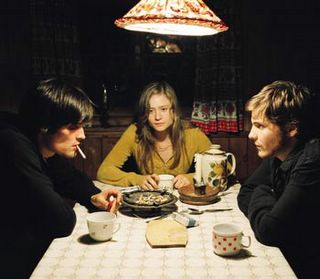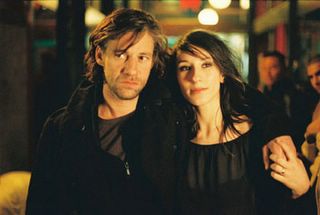Drei Deutsche Filme
It's purely coincidental that I have watched 3 German films this week. I certainly didn't set out to watch 3 specific movies in a row, like a special TEUTONIC THEME WEEK here at the blog, where I'd write about my fondness for certain types of sausages and my experiences at last year's Oktoberfest. But, as long as I've been watching them, might as well give you all a brief rundown, am I right? So, Konrad, this one's for you.
The Edukators
There's a really cool genre film going on deep within this 2004 political crime drama, but writer/director Hans Weingartner won't let it out. His script (co-written with Katharina Held) admirably has a lot to say, and it's certainly passionate, if not quite original. But the movie keeps getting crushed under the weight of the ideas.
The story in brief: Jan and Peter (Daniel Bruhl and Stipe Erceg), normal 20-something slackers by day, spend their nights breaking into well-appointed middle-class homes and rearranging all the furniture. They steal nothing - the goal is not material profit but spreading dread - and leave only a brief message: "Your Days of Plenty Are Numbered."
Yawn...
I'm sorry. I know, politically, I'm basically aligned with these guys (and presumably, the writer/director who created them). But Jan and Peter (and Peter's girlfriend, Jule, played by Julia Jentsch) ascribe to such an old-fashioned, generalized "radical Marxist left," it's a bit difficult ot take Weingarten's film seriously as a political statement. I mean, seriously, this film could have been made in the early 70's and been identical. It's a 2004 film about European youth activists, and there's no mention of globalization or European Unification or the Iraq War. Is sticking it to the bourgeoisie by tresspassing even against the law in Western Europe these days?
Like I said, hidden beneath the lengthy, self-important, semi-tedious scenes of political dialogue, there's kind of a cool thriller. In an effort to impress Jule, Jan takes her along one night on a break-in. Unfortunately, they are interrupted by the homeowner, who recognizes Jule immediately. They are left with no choice but to improvise a kidnapping, eventually roping Peter in with them.
The characters are pretty well-developed throughout, and it really pays off in these sequences, watching Jule react to and internalize the discovery of her boyfriend's secret life. Jentsch has a significantly charismatic presence as Jule, and she gets most of the film's best comic moments. (Though billed as a comedy, The Edukators is only sporadically funny).
This is the best stuff in the entire film by far. The film finally just shuts up for a little while with all the class warfare talk and just tells an engaging story. Unfortunately, Weingarten shoots himself in the foot by giving the hostage (Burghart Klaubner) an outspoken political viewpoint of his own. Ugh.
At 2 hours and 10 minutes, the film wears out its welcome. I would have preferred a lean, 90 minute comic thriller without all the socialism. And of course, it's not that I disagree, or that I think thrillers shouldn't involve world politics. It's just that its naive characters aren't really having the insights neccessary to sustain a 2 hour film about radicalism in today's Europe. They're more interesting dodging the authorities and sleeping with one another than pontificating about unionization.
The Lost Honor of Katharina Blum
As evidence that I don't mind a political thriller that's heavy on the political, I offer you 1975's paranoia classic The Lost Honor of Katharina Blum. This is a movie made in Germany just over 30 years ago, and it is so relevant to modern America, I'm seriously a little bit frightened right now...
Based on a book by revered German novelist Heinrich Boll (on whom my best friend Ariel wrote a lengthy report in our junior year of college), Katharina Blum chronicles the various ways in which an overzealous government aligned with a corrupt, propagandizing press can destroy an individual's life.
In Democratic West Germany, Katharina (Angela Winkler), a girl so demure her friends refer to her as "the nun," takes a chance by inviting a handsome stranger (Jurgen Prochnow) home to her apartment late one night. The police burst into her apartment in the morning - Ludwig, who has just left Katharina's side, is a wanted anarchist and bank robber.
For most of the film, it's unclear whether or not Katharina knows where Ludwig is hiding. Without any real proof of wrongdoing, Kommissar Beizmenne (Mario Adorf) decides that Katharina herself must be an anarchist, and interrogates her endlessly for information on her subversive activities. A slimy journalist in the employ of the aptly-titled The Paper, Werner Totges (Dieter Laser) cococts all manner of lies about Katharina, even forging or embellishing interviews with her neighbors, friends and her dying mother.
In one chilling scene that hits all too close to home in contemporary America, Totges invents fake information about Katharina which he then tells to Beizmenne, who repeats it back to him so he will have a quote for his article. This kind of back-room "creation" of the news, invented talking points used to slime a dissident, can't help but remind me of, say, the White House's campaign to smear Joe Wilson by outing his wife as a CIA operative.
That's basically it for the narrative of the film. Events continue to spiral increasingly out of control, with Katharina losing any semblance of privacy or dignity as a rabid media and a federally-sanctioned task force root through all the intimate details of her life. Most galling of all, the entire process rests on an obvious lie.
"If you are not guilty," Beizmenne tells Katharina, "then you have nothing to worry about."
But, really, Katharina has not even been charged with a crime. Certainly, she is guilty of sleeping with a man who is a wanted criminal (though whether his bank robberies can be justified by his political goals remains outside of the film's realm of discussion). But without a formal charge, how is Katharina even to know of what she might be guilty? And, of course, with someone prying into everything that you say and do, how can you not be at least a bit worried?
The filmmaking here is absolutely stellar, extremely expressive cinematography that's increasingly tight and claustrophobic as the film goes on. Like a lot of great 70's filmmaking, Volker Schlondorff's film has a natural, world-worn grittiness that really enhances the realism, particularly during the strange, unexpected climax. This is daring, provocative, substantial filmmaking.
Head-On
So is this.
My friend Ivan watched this Turkish-German co-production the other night and said it was really terrific, and I had seen it on a few Best of the Year lists, so I picked it up on a whim. I knew nothing going in.
What an amazing film. It's the kind of movie that takes you on a real journey. In every film, the main characters change over the course of the major events. But Head-On is one of those rare films where you actually watch characters grow as people and then feel that you, perhaps, have also grown as a person. I'm not saying that watching Head-On will make you a better person. It won't. But you will feel like a better person, at least for a little while, like someone who has had a fantastic dream that they only half-remember, but that was really inspiring at the time.
Cahit (Birol Unel) is a violent, arrogant, slovenly, alcoholic and suicidal late 30's punk rock burnout. Kind of life Klaus Kinski mixed with The Dude. One night, after drinking heavily, he plows his car directly into a concrete wall. While in recovery and counseling afterwards, he meets Sibel (Sibel Kekilli), a beautiful young party girl living under the oppressive thumb of her old fashioned Muslim father (Demir Gokgol) and brother (Cem Akin).
These two have three things in common: they hate their lives, they love drinking and doing drugs, and they are Turks living in Germany. Sibel suggests a marriage of convenience. Cahit will have someone to clean up his apartment and cook for him, Sibel will have an excuse to live outside of her family's house, so she can do whatever she wants.
I won't speak of anything else that happens in Head-On, because following these two delightful, lively characters through the unpredictable twists and turns of Fatih Akin's plot is most of the fun. Though Head-On starts as simply a bittersweet comedy about offbeat love, it defiantly refuses any attempt at categorization. As I said, when the ride is over, you feel like you've been some place with Sibel and Cahit, as if their travels - from Hamburg to Istanbul, in and out of one another's arms - have had some significance.
How does Akin get us to care so deeply for such self-involved (and self-destructive) characters?Cahit is so buried in the angry nihilism of his punk music and his bitter resentment over his failed life, it takes a while for Sibel to get through to him at all. And she's a coke-fueled slut whose prone to slitting her wrists (in improper, across-the-wrist fashion) whenever she doesn't get her way. The fact that these two manage not only to convincingly fall in love, but to engender real passionate concern from an audience of strangers, is a tribute to Akin's abilities as a writer and storyteller.
He even gets away with some flourishes I would normally not forgive. Inserted scenes of Turkish musicians playing traditional folksongs against the backdrop of Istanbul are pretty self-consciously arty and indulgent, but they are brief and do help to establish the passage of time. The Muslim hardliner brother character initially seems kind of over-the-top and simplistic, but a late scene in which he bonds with Cahit after years apart feels genuine, and represents one of the emotional climaxes of the entire film.
Head-On is a terrific film, one of the best romances I have seen in several years. It reminds me at times of a Kieslowski kind of movie, an astute, sharp human drama that's equally wrenching and comic. Available now on DVD and highly, highly recommended.

2 comments:
Thank you Lonnie! Your post has reached my heart at once. I have seen "The Educators" (Die Erziehungsberechtigten)and "Head-On"(Gegen die Wand). The third one "The lost honor of Katharina Blum" (Die verlorene Ehre der K.B.) I haven't seen, but it's quite famous in Germany. I like the books of the author Heinrich Böll (he has won the nobel prize of literature). A recommendation for reading one of his books (for example "Ansichten eines Clowns", I think "The Clown" in English)!
I agree with you on "The Educators", it was sometimes too long and erratic. The political background is vague. The kidnapped man is not authentic in my opinion. Sometimes he tries to collaborate, in the end he is shown as the hardliner. I loved Julia Jentsch in the movie, she is the highflying star of German actors 2005. And I think she has deserved it....
If there would not be Sibel Kekilli of "Head-On". Unbelievable movie, isn't it? I'm still excited and agitated when I think about it. It hit me in the face, gave me goose bumps and, well, also was a sexual experience in certain moments (by the way afterwards it was revealed, that Sibel Kekilli had taken part in some porn movies before changing to be a serious actress, a huge gossip for the yellow press). The main actors reached close to my heart and before it was torn apart, they were thrown away again. I was deeply touched, laughed, cried. I think I have to see it again.
Yeah, "Head-On" is a pretty spectacular film, with a fantastic break-out performance by Kekilli. Interesting stuff about the porno rumors...Have not heard anything about that. Not too hard to believe, though...She's clearly not shy.
Post a Comment